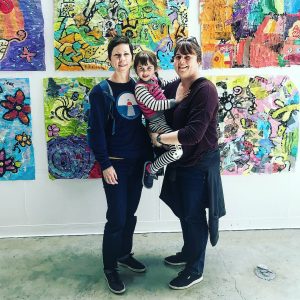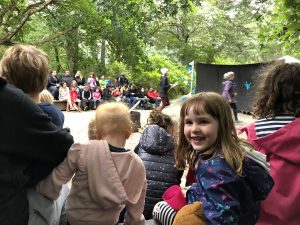By Nicole Eich
Our daughter Kathleen is 5. She’s a bright spark of a child – funny and engaging and curious. It’s been a joy to watch her grow, discover the world and see her interests develop. When we learned through the newborn hearing screening process that Kathleen was hard of hearing, we worried about what that would mean going forward. How might this change things for her? How would we, as her parents, gain tools and knowledge to be able to support her in whatever ways needed? And, importantly, how would this impact her ability to engage with people and the community?
Fortunately, we were connected early on with one of the fantastic service providers in BC for families with deaf and hard of hearing children, and over the past five years we’ve participated in a wide range of programs and events. From early on, we took Kathleen to baby and toddler programs at our early intervention centre. These not only provided a wonderful, safe environment for parents, the programs taught us ways to best support our child’s development, access various resources, handle hearing equipment and learn communication strategies. This early interaction with the centre was vital to us; it made us feel more confident about supporting Kathleen, and we feel very lucky to have had access to programming so specifically geared towards our child’s needs. Plus it was a fun and friendly place to be, and Kathleen always enjoyed our visits.
Since the baby/toddler days, we’ve continued to attend many events for families with children who are deaf and hard of hearing (family picnics, skating, visits to the pumpkin patch, science world and more!). Some of these are run through our early intervention agency but we also make the most of events offered through the other agencies, as well as the parent volunteer organisations. We’ve also joined group swimming lessons that have been available to young deaf/hard of hearing kids in Surrey, and Kathleen has enjoyed her weekly swimming lessons with other deaf/hard of hearing kids. Each year, we look forward to the Family Deaf Camp on Hornby Island run by Family Network for Deaf Children and Deaf Youth Today. All of these have given us the opportunity to connect with other kids and families, and become part of the deaf/hard of hearing ‘world’.
Early on, we learned about the importance of peer connections for the well being of deaf and hard-of-hearing people, even the very young. That’s why it’s very important to us that Kathleen has exposure to and creates relationships with other deaf/hard of hearing kids, that she sees other kids with hearing equipment and that she understands the diverse ways in which we can all communicate with each other. It’s also important to us that we feel connected as parents to other parents of deaf/hard of hearing kids. For these reasons, we’ll continue to build networks and friendships in this community and attend as many programs/events as possible.
All of this being said, we realized through engaging with these programs and events in the deaf/hard of hearing community, and through many conversations with parents and professionals that there was no reason we should hold Kathleen back from new experiences in our broader community. We want our daughter to feel confident in trying new things so from early on, we took Kathleen to a parent/tot class at a local music school, and then enrolled her in several other music and dance classes at the same school. She’s also played soccer with a local soccer club and she might try another sport this coming summer. We’ve taken her to a range of arts workshops and performances, she’s loved seeing the orchestra and the ballet, and she was recently thrilled to see her first movie at a theatre.
Before any of these experiences (and before going anywhere new), we do our best to think about the sound environment we’ll be going into, and the challenges that might be involved for our daughter’s communication. Places like pools, theatres or birthday parties can be very noisy, and her access to clear information can drop significantly as a result. The same challenge occurs with distance, as the further away from someone she is, the less she can make out what’s being said. Running around on the soccer field, for example, we could see that she was feeling challenged to hear/follow instructions from the coach.
We’re still learning how to best navigate these challenges – in advance of a class or team activity, we speak with the instructors if possible. We let them know about our daughter’s situation and ask if they’re okay with helping to make some adaptations. We describe what will be useful for her, such as making sure they’re facing her when giving instructions, speaking clearly, repeating what other kids have said, or being willing to speak to her individually to repeat instructions if she seems to miss something. We also have access to a personal DM system. We’re beginning to use it more frequently in challenging environments, as we notice how it increases her access to what’s being said. As well, we’re in the process of incorporating more American Sign Language into our family so that we have an additional communication option available to us.
Kathleen is at a great age to start advocating for herself. She’s really started to be aware of the fact that her hearing difference means that she doesn’t always have good access, and that it decreases in certain environments/situations. We’re teaching her to notice the times where she could benefit from positioning herself closer or asking someone to repeat what’s been said, or to try and find solutions if something’s not working for her. I’ll never forget the first time I saw her take charge of a situation in this way – we were at a birthday party at a karate school and the instructor had loud music playing in the background. Without prompting, Kathleen went to the teacher and told him the music was too loud for her and asked him to turn it down. It was a wonderful moment to see her self-advocate and a good reminder that kids can start to navigate their own world from an early age with the right support.
Going forward, it will be fascinating to see what sorts of interests and environments and communities Kathleen is drawn towards. Her hearing access has changed and so this might pose new challenges (or not), and as she gets older she’ll be better able to let us know what she finds enjoyable. We know this will be an ongoing journey but hopefully we’ve set her up to be resilient, to not hesitate about trying new things, and to be confident in her abilities no matter what the challenge.




